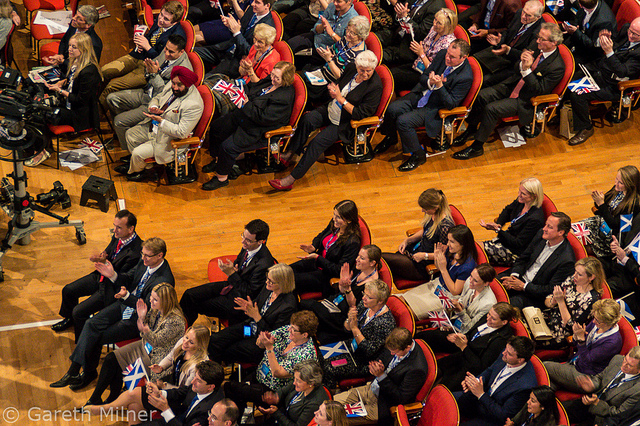Despite their manifest flaws, political parties improve democracy and it is implausible that it could be successful without them
Political parties are the gatekeeper to almost all democratic policies and offices. But they are often dismissed for only being interested in votes and not voters’ actual opinions. Citizens have become less partisan in the last decades. Perhaps it is time to get rid of them. Would we be better off without them? Not according to Ann-Kristin Kölln, who argues that parties are not strictly necessary but it is implausible that representative democracy could be successful without them.

Credit: Gareth Milner, CC BY 2.0
Political parties play a major role in democratic processes around the world. Citizens generally agree, but they also display growing critical attitudes and behaviour towards them. In the UK, as well as elsewhere, party identification is dropping and parties hold ever fewer members. Viewing them as necessary is perhaps only the result of a lack of alternatives. And if the popular image of parties is so poor, perhaps we should simply abandon them. Could we do without them, however? The answer is yes and no. Yes, because it is certainly possible to organise the democratic process without parties – probably much to their disgruntlement. No, because we would end up with a worse representative democracy. Parties increase predictability and transparency of policy outcomes, and they save politics from becoming a dispersed and even possibly a contradictory set of actions.
As soon as we think of democracy, we are thinking of elections and of parties. Democracies and parties seem almost inseparable. Empirically, it is impossible to know what modern democracy would look like without parties. We know what kind of politics to expect with more or fewer parties, with stronger or weaker ones. But because all large-scale democracies have some parties we do not know what it would be like without any.
So finding out what parties are adding to democracy becomes a theoretical exercise. Existing research in political theory has only recently started to take on the quest to explore the value of parties and partisans. In contrast, classic and contemporary theories of representative democracy specifically minimally consider party benefit. But this is an important point because direct democracy is still not an option on a large scale. Democracies with millions of voters probably still need some kind of representative system.
Representative democracies are built on two premises: firstly, citizens elect someone to act on their behalf in the future and secondly, by means of elections, citizens hold representatives accountable for what they have done in the past. Whether or not representatives should be acting by themselves or in groups is not clear. Electoral systems around the world reflect the diversity of ideas around this issue. On a theoretical level, however, groups of representatives (or parties) that decide on a joint programme before Election Day are preferable. Here are three reasons why.
Firstly, a government is formed more quickly. Imagine the UK would not have any parties at all, and all of the 650 parliamentary seats would be given to individual representatives acting on behalf of their voters. The MPs would still need to conclude on a prime minister, a government and a policy programme to be implemented. Even if they found common ground on all three fronts, it would take them a very long time. In comparison, this process is expedited with pre-election grouping of representatives. Finding a consensus amongst several parties is also a difficult and time-consuming exercise. Sometimes this consensus proves to be weak and not supported by a majority as is currently the case in Sweden, and sometimes finding a consensus can take years as in the case of Belgium 2007-2011. But normally the formation of governments, even coalition governments, only takes a few weeks.
Secondly, policy outcomes are more predictable and transparent. Voters already know before the election about the likely policies a winning party is going to implement. If there were no parties whatsoever, the imaginary 650 individual representatives in the UK would need to concur on a programme. A voter of an elected representative could then not be sure that many of his/her preferences would find their way into legislation. There are simply too many individual, competing proposals. A winning voter might not be a winner of policy. Of course, also in systems where coalition governments of several parties are the norm the predictability of policy outcome is lessened compared to a straightforward two-party system. But still, also in multi-party parliaments, voters of any of the governing parties can be relatively sure that at least a bigger subset of their preferred parties’ proposals will be implemented. If voters want to maximise their number of preferences being represented by the government, they should support groups of representatives or parties, instead of individual representatives.
Thirdly, policies are more coherent and durable. Imagine again the UK would have 650 individual MPs with no parties that group them. Without any overarching entity in place such as a party, it would be rational for MPs to only pursue small, easily recognisable projects. This would ensure visibility to those who voted for them, and it would increase the chance of re-election. But the risk this entails is that policies would not be coherent and easily reversible. They would not follow a bigger plan on what is beneficial for the country in the long run. A long-term vision for a country is, however, important to also tackle the big issues that require collaboration across portfolios such as taxation, constitutional or welfare state reforms. Nadia Urbinati goes even further and states that ‘the currency of representation is ideological’. Political parties combine individual ideas, interests and preferences to a larger vision or plan, often inspired by or accumulating to an ideology. Party policies are, therefore, more consistent and longer lasting.
To be sure, political parties are by no means flawless: party patronage, group discipline, party finance scandals and campaign-focussed behaviour are all areas of concern that political parties have to work on. This way, they will perhaps regain some citizen trust and revise citizens’ growing view that parties are necessary but only interested in votes and office. But even with these caveats of party democracy parties provide important qualities and we should not abandon them. They are not necessary for representative democracy to work in the sense that plants need water to grow – something parties need to be more often reminded of. But they improve politics and it is implausible that representative democracy could be successful without them.
—
Note: this post represents the views of the authors and not those of Democratic Audit UK, or the LSE. Please read our comments policy before posting.
—
 Ann-Kristin Kölln is COFAS Marie Curie Fellow and Postdoctoral researcher at the Department of Political Science at the University of Gothenburg. She is also Fellow at d|part, a think tank for political participation.
Ann-Kristin Kölln is COFAS Marie Curie Fellow and Postdoctoral researcher at the Department of Political Science at the University of Gothenburg. She is also Fellow at d|part, a think tank for political participation.





 Democratic Audit's core funding is provided by the Joseph Rowntree Charitable Trust. Additional funding is provided by the London School of Economics.
Democratic Audit's core funding is provided by the Joseph Rowntree Charitable Trust. Additional funding is provided by the London School of Economics.
[…] Despite their manifest flaws, political parties improve democracy and it is implausible that it could be successful without them, according to research by Ann-Kristen Koln. Find out more here. […]
Political parties improve democracy and it is implausible that it could be successful without them: https://t.co/DSWCFAc3q7 #RebootIreland
Despite their manifest flaws, political parties improve democracy https://t.co/qEKC48Zs8l More from Ann-Kristin Koelln of @d_part
Great article by our Ann-Kristin Kölln on #political #parties in #representative #democracy via @democraticaudit https://t.co/V0mGdZhr4I
Ann-Kristin Kölln writes article for @democraticaudit on political parties + their use for representative #democracy https://t.co/pAaDZaK5WM
Despite flaws, political parties improve democracy & it probably can’t work w/o them @democraticaudit https://t.co/DmP3culccp @nic_greenan
Despite their manifest flaws, political parties improve democracy – and it probably can’t work without them https://t.co/aKmJ1yFrLH
Political parties improve democracy and it is implausible that it could be successful without them https://t.co/eIXdqZ20rH
Despite their flaws, political parties improve democracy and it is implausible that it could succeed without them https://t.co/hHYnnByqS6
Despite flaws, political parties improve democracy beyond what would be possible without them https://t.co/APMqeppre3 https://t.co/4ZUFyqMLLO
Despite their manifest flaws, political parties improve democracy and it is implausible that it could be successful… https://t.co/y0pawTz7ao